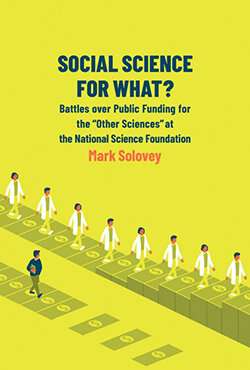[ad_1]

Early in the Chilly War era, “social sciences were criticized for not getting really scientific—for currently being ideological and political in techniques that might seem to be to have been disguised as science,” suggests Mark Solovey, a professor in the Institute for the Background & Philosophy of Science & Know-how at the University of Toronto.
“[At the time], there was animosity in the U.S. to socialism and communism. This prompted a large amount of issues for social scientists and their supporters, who argued for a science of society which was separate from ideology and politics.”
Social scientists ended up also pressed about the social relevance of their perform about complications this sort of as racism, revenue inequality, and criminal offense, and threats to democracy, Solovey adds.
Solovey’s latest e book, “Social Science for What?: Battles Around General public Funding for the ‘Other Sciences’ at the Countrywide Science Foundation,” explores the historic distrust of social science, which he claims continues to this day. He argues that when it comes to funding for academically oriented study, American social scientists have been additional dependent on the U.S. National Science Foundation than their counterparts in normal science—the latter also uncover robust support from other science patrons. Nonetheless, at the NSF the social sciences have experienced to contend with less regard more than a lot of many years owing to crucial attitudes towards the discipline.
Solovey has lengthy studied the growth of the social sciences in the U.S. In the case of the NSF, he states, support has always been hampered by “scientism,” the perception that organic science, governed by immutable rules and grounded in rigorous strategies of inquiry, existed on a a lot more elevated airplane that the social sciences essential to emulate.
Like pure researchers, social scientists are concerned with evidence-based mostly investigate and use both quantitative and qualitative applications to arrive at conclusions. But they are uniquely involved with human society and social relationships, which are entangled with normative judgments and morality.
“When the NSF was recognized, its founders had to determine: Is there these types of a issue as a social science and, if so, how would we know if we see it?” Solovey says. “Specified spots of investigation have been institutionalized, these types of as sociology, economics, anthropology, political science. Psychology has spots that are more social, other individuals that are additional organic. There have usually been boundary disputes.”
Social science funding has only ever represented a smaller proportion of the NSF’s finances. “In the late 1950s social sciences represented possibly two percent of the full,” claims Solovey. “Then arrived the 1960s, which was a distinctive period in U.S. culture.”
At that point, social science entered a form of golden age because of to its association with daring plan initiatives introduced during the presidencies of John. F. Kennedy and Lyndon B. Johnson. Researchers aided to market federal programs to tackle a wide array of troubles, like, as Solovey writes, “juvenile delinquency, urban blight, racial conflict, poverty and unemployment.” By the late 1960s, the NSF allotted around 7 % of its funds to social science—”the maximum it is at any time reached,” Solovey states.
But in the 1970s, the pendulum swung back toward conservative distrust. Liberals also expressed mistrust of some social science exploration, particularly that which they noticed as serving conservative financial or political beliefs, practices and procedures.
Solovey’s reserve requires audience to the conclude of the Reagan presidency and, in a limited final chapter, up to the current working day, leaving thoughts about the foreseeable future of social science assistance in the U.S.
His book proposes a new funding company for the social sciences in the U.S.: a Countrywide Social Science Foundation, which would look for to support social exploration on a broad front by welcoming and selling operate grounded in humanistic as properly as scientific approaches—perhaps alongside the strains of Canada’s Social Sciences and Humanities Research Council.
“This proposal previously arrived up in the late 1960s when there was a good bit of fascination,” Solovey claims. “For me, it’s the most appealing episode in the complete story: there was a proposal in Congress, there had been countrywide hearings, the Senate voted to guidance it. But it never ever received aid in the Dwelling of Reps. And, by the late 1960s, the local weather had modified and the complete thought disappeared. Since then, this notion has mainly vanished.”
In their investigations of work trends, poverty, political actions, human sexuality and so several other domains, Solovey notes that social researchers carry on to depend on resources of public and personal assist. The contributions that they can make to modern society are all the a lot more important in times of world-wide sickness, war, and weather modify.
“I would really substantially like American social researchers and individuals intrigued in the difficulty of funding to guidance a proposal for a National Social Science Basis.”
Citation:
Hampered by ‘scientism?’ Researcher examines the heritage of American social science (2022, April 13)
retrieved 20 April 2022
from https://phys.org/news/2022-04-hampered-scientism-record-american-social.html
This doc is subject to copyright. Aside from any truthful working for the reason of private review or investigate, no
component may be reproduced with no the created authorization. The information is presented for information and facts applications only.
[ad_2]
Resource hyperlink


More Stories
How Social Sciences Shape Our Modern World
Why Social Sciences Matter More Than Ever
The Hidden Power of Social Sciences in Policy Making